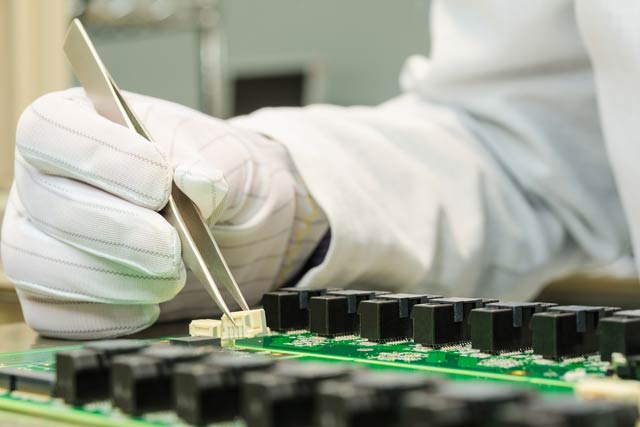
Support justice-driven, accurate and transparent news — make a quick donation to Truthout today!
On Monday, March 16, Pauline Overeem, international coordinator of Good Electronics, presented a challenge to the electronics industry in the form of a call endorsed by more than 200 organizations, researchers and activists, demanding meaningful action to prevent harm to workers exposed to toxic chemicals.
Overeem presented the challenge in Brussels, Belgium, at a meeting of the Electronic Industry Citizenship Coalition (EICC), an industry organization whose members include over 100 corporations, including industry giants like Samsung and Apple.
The challenge, lead by Good Electronics and the International Campaign for Responsible Technology (ICRT), comes on the heels of research finding that 35 workers at a Samsung chip plant in South Korea developed leukemia and lymphoma after working with toxic chemicals. Ten have died since the cancer was identified in 2007. Good Electronics reports that 1,000 workers at a now-closed RCA plant in Taiwan contracted cancer, and 157 have died.
Other chemicals regularly used in electronics production, like benzene, a known carcinogen, and n-hexane, are extremely dangerous when handled without proper training and protection. In 2011, the Institute of Public and Environmental Affairs in China reported that workers at two Apple suppliers who had been exposed to n-hexane, then used as a “miracle” cleaning solution for Apple product screens, suffered neurological damage, numbness to limbs, lethargy and an inability to move their bodies. After years of pressure from IPE, Apple banned the use of n-hexane and benzene at its suppliers, but their threat to workers throughout the industry remains.
In February, Nicki Lisa Cole and Jenny Chan reported on the additional problem at Apple suppliers of workers’ exposure to toxic and dangerous aluminum dust, which has the potential to cause serious respiratory ailments and poses a risk of fire and explosion when not properly ventilated.
Though the EICC audits its corporate members, Overeem stated in a March 16 press release that these audits are neither rigorous, nor transparent. Specifically, she said, “These corporate audits don’t uncover chemical exposures and other labor rights violations all the way down the supply chain. There is a clear disconnect between the audits’ findings and the grim reality in many factories. That’s why we are challenging the industry to clean up its act now.”
Another problem within the industry is that many large brands like Apple and Samsung claim, when problems are exposed, that they are unaware of what happens at their suppliers due to the complex, lengthy nature of global supply chains. Ted Smith of ICRT finds this hard to believe, saying, “It’s astonishing that the most technically savvy companies in the world, whose names are on our electronics, say they still don’t know all of the materials used in their own products or in their supply chain production factories. What we need from this important industry is safe jobs and healthy families, where the next generation of children is at least as important as the next generation of chips.”
Those who have signed the challenge call on the industry to take these problem much more seriously and to move forward quickly with real change, rather than with more savvy campaigns of public relations.
The challenge demands that the industry recognize that workers have rights to safe and healthy workplaces, and to know what hazards are present in them; to effective remedies and treatment when they are harmed; and to freely organize and bargain collectively. In addition, it demands that the industry acknowledge the rights of people who live in the communities where production takes place to safe environments and public health.
The challenge outlines six key areas for change and action that it expects big brands, manufacturers and suppliers to address, including transparency; use of safer chemicals; real and effective worker protections; inclusion of workers in management decisions; protection of communities and the environment; and compensation and remediation when people and the environment are harmed. (See here for details of these areas in the full challenge.)
Good Electronics and ICRT have invited members of the EICC to offer feedback on the challenge, and will keep the public updated on progress as this conversation unfolds.
A terrifying moment. We appeal for your support.
In the last weeks, we have witnessed an authoritarian assault on communities in Minnesota and across the nation.
The need for truthful, grassroots reporting is urgent at this cataclysmic historical moment. Yet, Trump-aligned billionaires and other allies have taken over many legacy media outlets — the culmination of a decades-long campaign to place control of the narrative into the hands of the political right.
We refuse to let Trump’s blatant propaganda machine go unchecked. Untethered to corporate ownership or advertisers, Truthout remains fearless in our reporting and our determination to use journalism as a tool for justice.
But we need your help just to fund our basic expenses. Over 80 percent of Truthout’s funding comes from small individual donations from our community of readers, and over a third of our total budget is supported by recurring monthly donors.
Truthout has launched a fundraiser to add 500 new monthly donors in the next 9 days. Whether you can make a small monthly donation or a larger one-time gift, Truthout only works with your support.